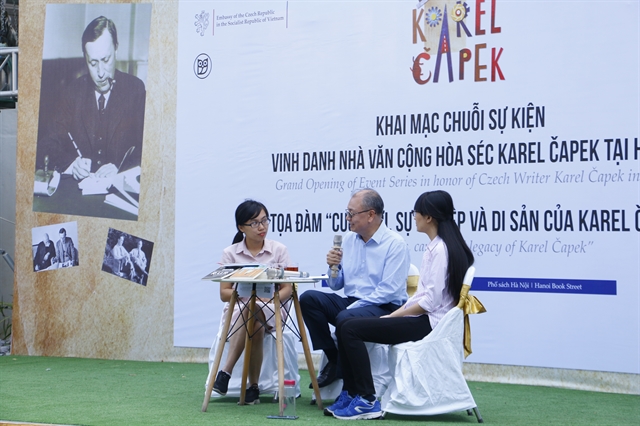
Karel Čapek (1890 - 1938) and the People´s Papers where he worked until his death. Photo courtesy of the embassy
HÀ NỘI Talk shows, story-telling and film screenings are some among the activities being held to honour Karel Čapek (1890-1938), a Czech author who received international acclaim and was popular among Vietnamese readers.
Čapek was the most widely read modern Czech author, said Renata Greplova from Czech Embassy.
“For many Czechs, he was not only a famous writer but also a model of morality for his stances on politics.”
Čapek studied philosophy, aesthetics and art history at Charles University in Prague, but he also spent time at universities in Berlin and Paris.
He was fluent in German, French and English. After graduation, Čapek worked as a journalist. He started as the cultural editor at the National Newspaper, and in 1921 he moved to the People´s Paper where he stayed until his death. He also worked as a playwright.

(From left) Editor Nguyễn Ngoan, translator Phạm Công Tú and literary critic Nguyễn Quyên at a seminar to honour the writer. Photo courtesy of the embassy
What made Čapek world famous was one of his early plays Rossum’s Universal Robots (RUR) staged in 1920.
“We should mention that the word ‘robot’ was used for the first time in this,” said Greplova. “The word derives from the Czech word ‘robota’ which means hard work or slavery.”
Some of his later plays contain strong anti-war sentiment such as Mother (1966) and The White Disease (1937).
Čapek is also known for his unique sci-fi novels that predict the future. His work warned people of the dangers of mass production and the use of nuclear weapons many years before they became a real threat, such as Absolutno in Large (1922), Krakatit (1922) and War with the Newts (1936).
Čapek also wrote poetry and short stories and together with his brother Josef, who became a renowned painter, they were part of several pioneering groups in Czech modern art and poetry. Čapek wrote six travel books documenting his travels around Europe as well as several children’s books which feature his own drawings.
Čapek was nominated for the Nobel Prize for Literature from 1932 to 1938, but he never won. However, there are several literary awards named after him.
The opening ceremony of the programme took place on Sunday in Hà Nội.
Translator Phạm Công Tú went to the Czech Republic in 1974 to study at the Technical University and wanted to read literature to improve his language skills. Čapek was his first choice. In 2014, Tú decided to translate his works into Vietnamese.
“I love many things about Karel Čapek, but if I have to choose only a few points to tell you, I appreciate his talent of capturing the Czech spirit, and as a technician, I admire him as a visionary thinker who could see beyond his time,” he said.
“Translating Čapek’s works widened my view. I tried my best to stay loyal to his spirit, even fighting with other editors to keep certain words,'' he said.
A meeting with the actors who performed in Čapek's play The White Disease in 1987 will be held tonight at the Việt Nam National Drama Theatre. It will be followed by a screening of the film adapted from the play.
Prof Verita Sriratana from Chulalongkorn University (Thailand) will host talk shows on Čapek's works on Friday and Saturday at Toong Coworking Space, 8 Tràng Thi Street, and the Hà Nội National University of Education, 136 Xuân Thủy Street.
The programme will end with a screening of the cartoon All about Doggie and Pussycat adapted from Josef Čapek’s work and a reading of the book in Vietnamese with artist Xuân Bắc on Saturday at the Việt Nam National Drama Theatre.
Over the past two years, the embassy has organised inspirational events that have drawn the attention of Vietnamese readers, especially young people.
The programme honouring Čapek is a part of cultural activities to enhance mutual understanding between the two peoples and promote Czech culture and literature in Việt Nam. VNS
OVietnam